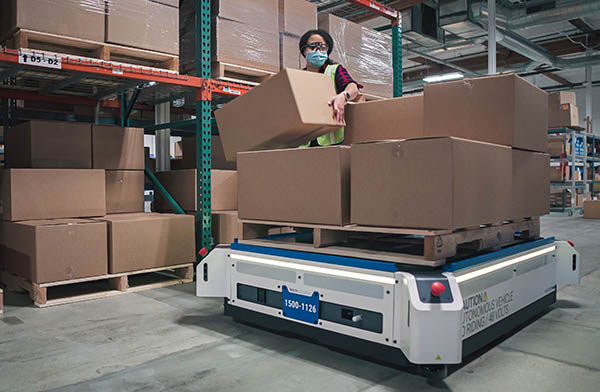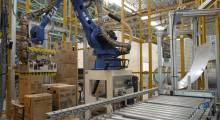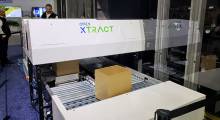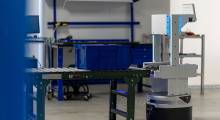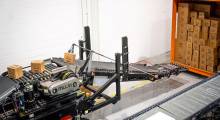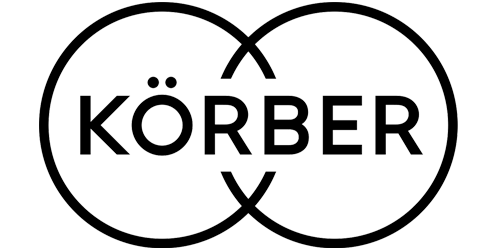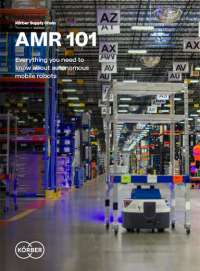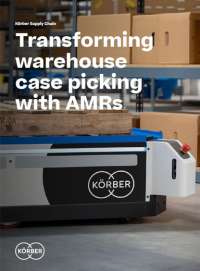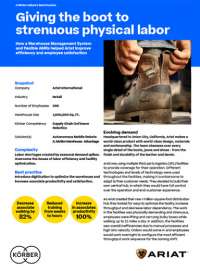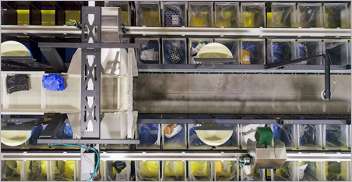Fetch Robotics Inc., which provides cloud-connected robots, today announced a new integrated case pick-to-pallet system with The Körber Group. The system dynamically integrates the movement of Fetch's Freight500 and Freight1500 autonomous mobile robots with Körber's warehouse management systems. The partners said their combined offering can orchestrate warehouse associates and robots and optimize care-picking workflows.
In the past year, growing e-commerce demand has put stress on distribution centers (DCs). In addition, longstanding shortages of skilled labor have made it difficult for companies to hire and retain staffers, accommodate seasonal fluctuations, and rely on temporary workers to operate forklifts, said San Jose, Calif.-based Fetch.
“Warehouses today are contending with record order volumes and limited access to labor, and [they] need flexible solutions more than ever before,” stated Stefan Nusser, chief product officer at Fetch Robotics. “Our new case-picking solution enables customers to achieve safer, more efficient case picking in facilities of all sizes.”
“Fetch Robotics continues to develop cutting-edge automated warehouse solutions and this new integrated case pick-to-pallet solution will help speed up fulfillment, improve safety, and enhance workflows for our customers worldwide,” said Nishan Wijemanne, global leader for autonomous mobile robots (AMRs) and robotics at Körber Supply Chain.
Limitations with current case picking
“Case picking was on our radar for a while, and we're always looking to work with partners on workflows where AMRs can improve processes,” Nusser told Robotics 24/7.
In a traditional case pick-to-pallet workflow, pickers spend the majority of their shifts driving a forklift or pulling a manual pallet jack around the warehouse to each location on their pick sheet or RF device. After arriving, the picker must find the correct product, execute the pick, return to the forklift or pallet jack, and travel to the next location until the entire pallet is complete.
“In one instance, mixed cases are assembled based on store-replenishment systems,” explained Nusser. “In another, B2C [business-to-consumer] or e-commerce orders are fed to the WMS [warehouse management system] and need case picking as the upstream process feeds into each picking and replenishment. The WMS drives it, based on its view of inventory in pick modules.”
In both store replenishment and e-commerce, human operators spend a lot of time getting on and off forklifts, traveling, and building mixed-case pallets. “If we restructure this workflow so the operator remains in a zone, the AMRs can do most of the driving, yielding substantial productivity gains,” Nusser said.
Another reason to automate the process is to improve worker safety. “According to OSHA [the Occupational Safety and Health Administration], if you have 15 forklifts, you'll have one injury per year,” said Nusser. “Each one costs $150,000 for the operator. Fetch's Freight1500 AMR has 360-degree sensor coverage and can move forward and backward. It reduces the problematic model of forklifts mixing with people.”
Zone-based picking
Fetch and Körber said their new system enables zone-based picking, which keeps employees in aisles and enhances picking across numerous orders. This workflow uses pick-path optimization functionality in the Körber WMS and can be deployed via RF scanners, voice picking, or along with vision-based picking solutions.
“With FetchCore and Workflow Builder, there's no need to for an integrator—most customers can take on everything else on their own,” Nusser asserted. “Körber WMS gets the orders for different pallets, minimizes the path for individual pallets, and provides workflow optimization.”
“Then the instructions flow to FetchCore, which commissions the robots and sequences picking locations,” he added. “The AMR then waits for the picker to load the correct pieces, and voice guidance can tell workers to go to locations within the same aisles. Through a microphone, they can confirm and let the WMS know the pick is complete. Replacing the time spent walking is the key value proposition.”
How much effort did it take to integrate Fetch's software and AMRs with Körber's WMS? “It builds on the work we've done together in the past on fulfillment, each picking, and other integration,” replied Nusser. “It is the first time we're bringing WMS integration with our larger AMRs, and there were some considerations unique to case picking, such as interfacing with strech wrappers.”
Fetch and Körber said their combined systems can also optimize discrete order picking, batch picking, and replenishment.
Zebra acquisition to help Fetch scale
Earlier this month, Zebra Technologies Corp. said it will acquire Fetch for $290 million. The combination of Zebra's supply chain expertise and Fetch's cloud robotics, software, and services will help scale e-commerce automation, said Nusser.
“I'm genuinely very excited about this. We're in a space where opportunities are growing exponentially,” he said. “There's a wave of work coming from e-commerce transformation, where we can create a lot of value for different customers dealing with static or shrinking labor pools.”
“Many of our customers are also Zebra partners, and many Körber interact with their systems on Zebra systems such as vision-guided devices,” Nusser added. “Productivity is our primary value driver, and broadening the group of people who can pick from those who must be certified to operate forklifts creates the possibility of pulling people from order picking to case picking. It becomes easier to optimize the workforce with a single larger labor pool for both operations.”
About the Author
Follow Robotics 24/7 on Linkedin
Article topics
Email Sign Up

